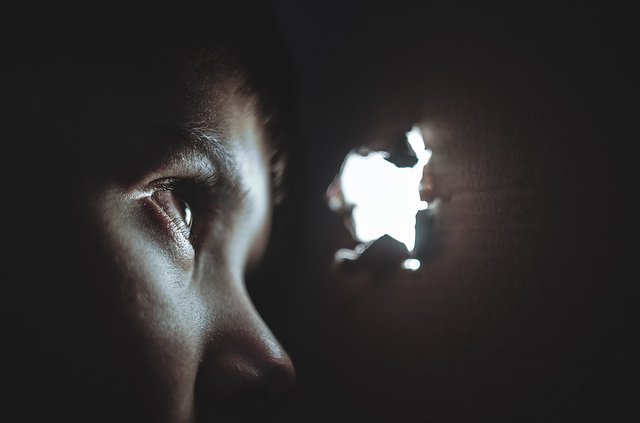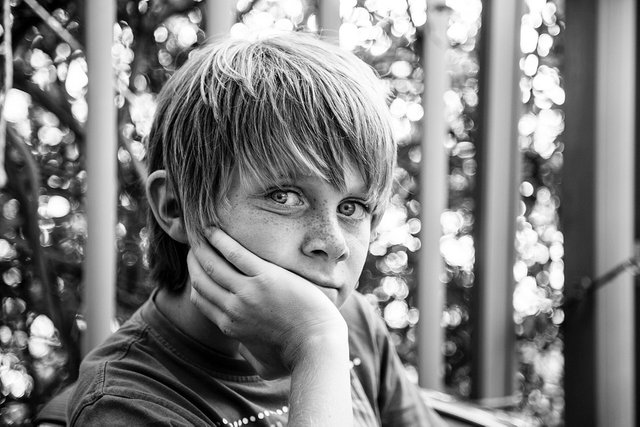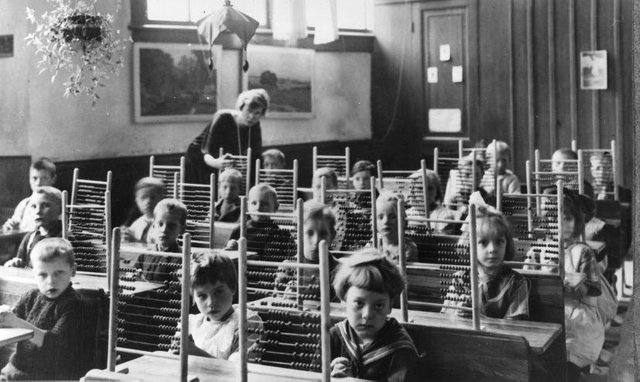Today, I received an alumni newsletter from my high school. By flipping through the pages, I experienced a flashback to that formative time in my life.

I remembered the nervous jitters I had the night before my first day of freshman year. I thought back to the severe anxiety, self-doubt, and the utter alienation I ultimately experienced as a student. I recalled my total disinterest in a majority of my classes, which eventually led to poor attendance and mediocre academic performance.
I reflected on how I couldn't keep up in the intense social environment of high school, where nearly every interaction with my peers felt like a tryout for gaining respect and popularity. I was reminded of how separated I felt from the education process itself, and how all of these things fed one another until I had nearly lost my identity completely.
At the time, I didn't have the vocabulary or information to fully grasp what was happening to me. This was school as I knew it, and at the time I didn't give deep thought to what was happening. And for many years after graduating high school, I was still unable to put the pieces together about what had occurred.
And then I discovered John Taylor Gatto's work
It wasn't until my last year of college that I was introduced to Gatto and his work regarding the education system in America (and most of the western world). It was then that I was able to better understand and come to terms with my schooling experience.
I discovered Gatto through the work of Jan Irvin and his Gnostic Media podcast, specifically this episode. My mind was blown.
Finally, there was someone out there who had put the pieces together regarding what our schooling process was really about. His essay 'The Seven Lesson Schoolteacher' is one of the most powerful pieces I've read regarding what we pass off as an 'education'. It is included in his book 'Dumbing Us Down: The Hidden Curriculum of Compulsory Schooling'. Here is a brief excerpt from the essay, discussing one of the seven lessons:
The first lesson I teach is confusion.
Everything I teach is out of context... I teach the unrelating of everything. I teach disconnections. I teach too much: the orbiting of planets, the law of large numbers, slavery, adjectives, architectural drawing, dance, gymnasium, choral singing, assemblies, surprise guests, fire drills, computer languages, parent's nights, staff-development days, pull-out programs, guidance with strangers you may never see again, standardized tests, age-segregation unlike anything seen in the outside world... what do any of these things have to do with each other?
Meaning, not disconnected facts, is what sane human beings seek, and education is a set of codes for processing raw facts into meaning. Behind the patchwork quilt of school sequences, and the school obsession with facts and theories the age-old human search lies well concealed. This is harder to see in elementary school where the hierarchy of school experience seems to make better sense because the good-natured simple relationship of "let's do this" and "let's do that now" is just assumed to mean something and the clientele has not yet consciously discerned how little substance is behind the play and pretense.
Another important lesson:
The third lesson I teach kids is indifference. I teach children not to care about anything too much, even though they want to make it appear that they do. How I do this is very subtle. I do it by demanding that they become totally involved in my lessons, jumping up and down in their seats with anticipation, competing vigorously with each other for my favor. It's heartwarming when they do that, it impresses everyone, even me. When I'm at my best I plan lessons very carefully in order to produce this show of enthusiasm. But when the bell rings I insist that they stop whatever it is that we've been working on and proceed quickly to the next work station. They must turn on and off like a light switch. Nothing important is ever finished in my class, nor in any other class I know of. Students never have a complete experience except on the installment plan.
Indeed, the lesson of the bells is that no work is worth finishing, so why care too deeply about anything? Years of bells will condition all but the strongest to a world that can no longer offer important work to do. Bells are the secret logic of schooltime; their argument is inexorable. Bells destroy the past and future, converting every interval into a sameness, as an abstract map makes every living mountain and river the same even though they are not. Bells inoculate each undertaking with indifference.
In a world of diversion, indifference can be fatal
Though there are plenty examples of people who persevere and are able to rise above this toxic learning environment, an even greater number of children are left behind in the process. After rebelling from this unnatural learning environment, many of us lose ourselves to drugs, alcohol, mindless entertainment, and a whole host of other distractions that prevent us from reaching our true potential.

Most people haven't truly asked themselves who they are, what they want from life, and perhaps most importantly, how they intend to get there. This is because school is not about the individual finding themselves, it is about the individual conforming to the expected norms.
The Prussian Model
In the late 19th century, the Prussian empire was dealing with a dilemma. Soldiers in the Prussian military were defying orders, as they were taught concepts of critical thinking. Of course, a force that cannot be moved to fight is not dependable for going to war, so this had to be stopped.
And thus, the Prussian education model was born. The system consisted of standardized tests, compulsory attendance, and fragmented curriculum compartmentalized into various subjects with no obvious coherence. Centralized schooling would reduce individual and critical though in service of collective uniformity in thought.
Expecting people to conform to this type of system and environment is, frankly, insane. School subverts our imagination, creativity, and ability to be sovereign individuals. We are left to pick up the pieces upon graduation, and a process of unlearning and re-examination is required to make sense of our world.
I don't mean to say that individual teachers and educators are themselves child abusers.
I believe the vast majority entered the profession with noble intentions, and truly do their best within the circumstances. Many teachers rise above the system to do incredible work with students, and I don't mean to demean or discredit everyone involved in schools. The circumstances severely restrict the ability of a teacher to engage students in the education process. There are some private schools that offer more reasonable alternatives, but these are often expensive and unavailable for most of the population.
I believe as humans, we have the innate desire to learn, to grow, and to reach new heights within ourselves. Yet, schooling squashes this desire by presenting a false version of what education is.
Coming to terms with this fact hasn't been easy, but it has helped me put my experience into perspective. I now understand why I felt alienated from my studies and why I experienced a strong disconnect within the environment of my school. It wasn't healthy, it wasn't helpful, and it was ultimately harmful to my development. But as with anything, awareness is the first step to recovery.
There are uncomfortable truths we must face if we are to change our circumstances. And understanding these facts will be an immense benefit to our continued education as a human beings.
__
Uncredited images from the pixabay.com

Maybe the huge pressure you had in school were due to a combination of modern schooling but combined with your mental health. Yeah, school is not the best time for many people, but if you had the problems in social areas and it felt like mild child abuse, you should consider that this issue might not be of so singular cause.
Downvoting a post can decrease pending rewards and make it less visible. Common reasons:
Submit
Yes, I had issues separate from school. I don't mean to suggest that all of my issues in high school were due to school itself, but whatever issues I had were compounded and magnified by it.
Forcing children to 'learn' in such an unnatural environment creates tension in the mind, which leads to children lashing out at one another. Bullying in school would happen much less often if children weren't spending most of their waking life in an institution that breeds discontent. I strongly suggest reading the 7 lesson schoolteacher essay as a way of better understanding the gravity of the situation.
Downvoting a post can decrease pending rewards and make it less visible. Common reasons:
Submit
That's true, but yet we need education on children badly, even if they don't want it. What are the alternatives to our current school system?
Downvoting a post can decrease pending rewards and make it less visible. Common reasons:
Submit
People have a natural curiosity to learn and discover. I believe creating environments that are more conducive to bringing out this nature are the way to achieve this.
Of course we need education to reach our potential, but we need to throw out the existing paradigm completely and start over. A reexamining of the curriculum and what school intends to achieve and through what means is an absolute necessity.
Frankly, I don't see government schooling ever reaching this point. I believe the homeschooling movement is an answer. I know it isn't always available to many parents when both are working, but I believe if we value our children's future and raising them according to our ideals, it is worth the challenge.
Years ago, I ran a small group in my town. I had a woman come speak to us about the idea of unschooling, as she was practicing it with her children. There are varying degrees of this method, but the basic idea is allowing children to learn on their own terms, because we are most engaged in our education when we are the ones deciding what to focus on.
I intend to seek out unschooling/homeschooling movements in my area to discover what others are doing to remediate this situation. I will report back with another post and let you know what I find!
Downvoting a post can decrease pending rewards and make it less visible. Common reasons:
Submit